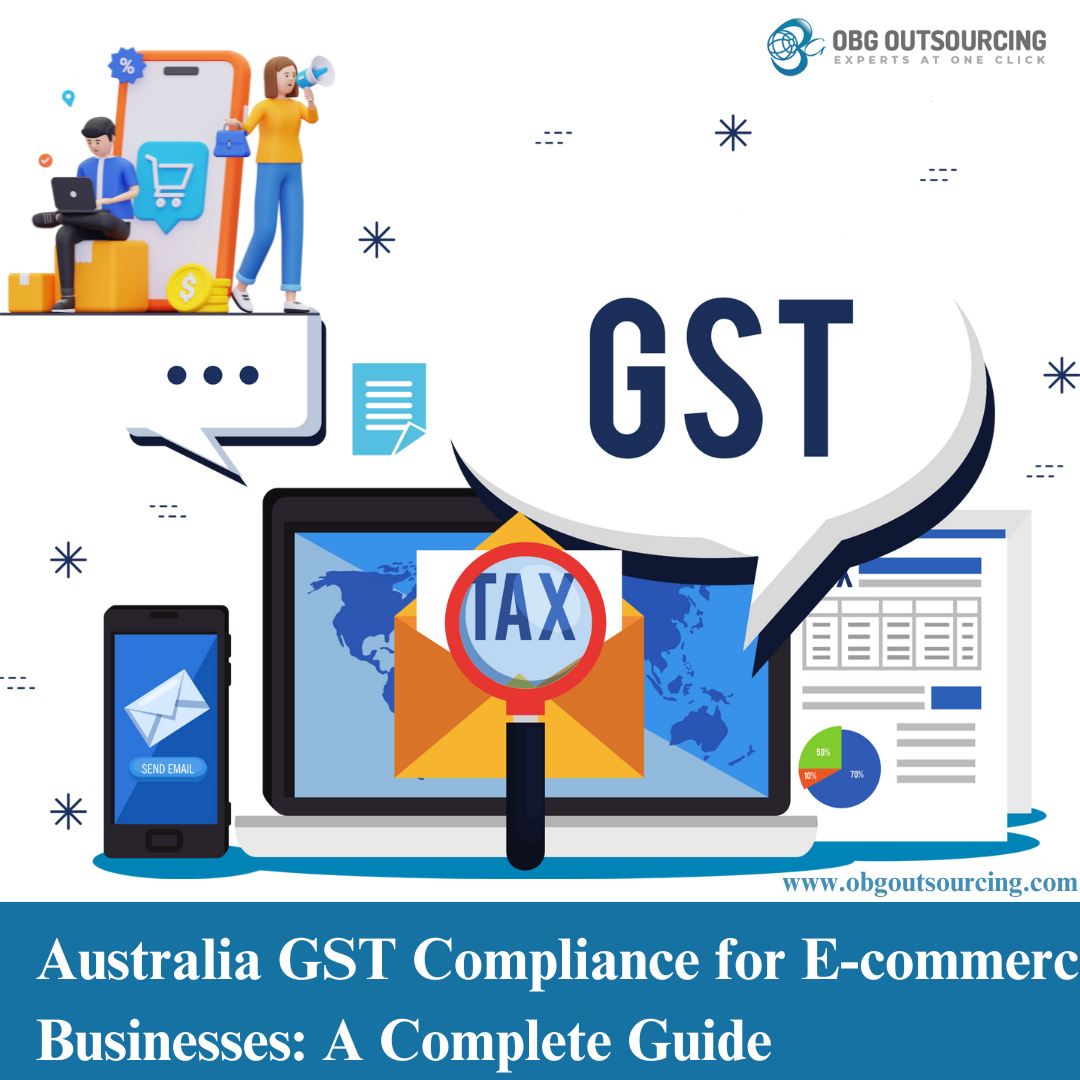The e-commerce industry in Australia is growing rapidly, and businesses selling goods and services online must comply with Goods and Services Tax (GST) regulations. Understanding GST compliance for e-commerce businesses in Australia is essential to avoid penalties and ensure smooth operations. This guide will help online businesses navigate Australia’s GST rules, australia gst ecommerce, including how to calculate GST, specific compliance requirements, and how OBG Outsourcing can assist in managing your tax obligations effectively.
What is GST Compliance for E-commerce Businesses in Australia?
GST is a 10 percent tax applied to most goods and services sold in Australia, including those sold by e-commerce businesses. Whether you operate a domestic online store, marketplace, or international e-commerce platform, your business must comply with Australian GST laws.
Who Needs to Register for GST?
E-commerce businesses must register for GST if:
Their annual turnover is $75,000 or more (for businesses and sole traders).
Their annual turnover is $150,000 or more (for non-profit organizations).
They are selling imported low-value goods (under $1,000 AUD) to Australian consumers.
They are a foreign business selling digital products or services to Australian customers.
How to Calculate GST for E-commerce Businesses in Australia?
1. Adding GST to Your Prices
If your business is registered for GST, you must include 10 percent GST in your prices. For example, if you sell a product for $100, the total price with GST will be $110.
Formula:
GST-inclusive price = Base price × 1.10
GST amount = Base price × 0.10
2. Claiming GST Credits
If you purchase goods or services for your e-commerce business and are charged GST, you can claim GST credits when lodging your Business Activity Statement (BAS).
Example:
You buy inventory worth $1,100 (including $100 GST).
You sell the inventory for $2,200 (including $200 GST).
You owe the ATO $200 - $100 = $100 in GST.
3. Reporting and Paying GST
Businesses must report and pay GST through quarterly or monthly BAS lodgments. The Australian Taxation Office (ATO) requires e-commerce businesses to track GST collected on sales and GST credits from purchases.
GST Rules for E-commerce Businesses in Australia
1. GST on Domestic E-commerce Sales
Australian e-commerce businesses must charge 10 percent GST on all taxable supplies.
GST applies to both physical goods and digital services sold online.
2. GST on Low-Value Imported Goods
Overseas sellers selling goods under $1,000 AUD to Australian consumers must collect 10 percent GST at checkout.
GST applies even if the goods are shipped from outside Australia.
3. GST for Online Marketplaces
Online marketplaces (Amazon, eBay, Shopify, etc.) may be responsible for collecting and remitting GST instead of individual sellers.
If the platform collects GST, sellers do not need to charge GST on their sales.
4. GST on Digital Products and Services
Foreign businesses selling digital products, e-books, software, and streaming services to Australian consumers must register for GST and charge 10 percent GST.
B2B sales (business-to-business) may not require GST if the buyer provides an Australian Business Number (ABN).
5. GST-Free and Exempt Sales
Some goods and services, like fresh food, healthcare, and education, may be GST-free.
GST is not charged on exports if the goods are shipped outside Australia within 60 days of purchase.
How OBG Outsourcing Can Assist with GST Compliance for E-commerce Businesses
Managing GST compliance for e-commerce can be complex, especially for businesses selling across different platforms and countries. OBG Outsourcing provides expert accounting and tax services tailored to Australian e-commerce businesses, ensuring full GST compliance.
Our GST Compliance Services for E-commerce Businesses
GST Registration: Helping businesses register for GST and comply with ATO requirements.
BAS Lodgment: Preparing and filing Business Activity Statements accurately and on time.
GST Calculation & Reporting: Ensuring accurate GST collection, credits, and payments.
Marketplace & Multi-Channel Integration: Managing GST compliance across platforms like Amazon, eBay, Shopify, and WooCommerce.
International GST Compliance: Assisting foreign businesses with Australian GST obligations.
Automated GST Tracking: Integrating Xero, QuickBooks, MYOB, and other accounting software for streamlined GST management.
Why Choose OBG Outsourcing for GST Compliance?
Expert Knowledge of Australian GST Laws – Our professionals stay updated with the latest ATO regulations.
Cost-Effective Solutions – Reduce accounting costs while ensuring full compliance.
Cloud-Based Accounting Integration – Work with Xero, QuickBooks, and MYOB for real-time tax tracking.
Timely & Accurate Lodgments – Avoid penalties with on-time BAS and GST filings.
Conclusion
Navigating GST compliance for e-commerce businesses in Australia can be challenging, but accurate tax management is essential to avoid penalties and maintain financial stability. Whether you are selling locally or internationally, understanding Australian GST laws ensures that you collect and remit the correct tax amount.
With OBG Outsourcing, you can simplify GST compliance, streamline financial reporting, and focus on growing your business. Let our team of experts handle your GST registration, BAS lodgments, and tax calculations with precision and efficiency.
Get in touch with OBG Outsourcing today for expert GST compliance services tailored for Australian e-commerce businesses.
 USA
USA UK
UK Australia
Australia UAE
UAE Canada
Canada

_(7).jpg)
_(6).jpg)


_(5).jpg)
.jpg)
_(4).jpg)
_(1).jpg)
_(2).jpg)
.png)